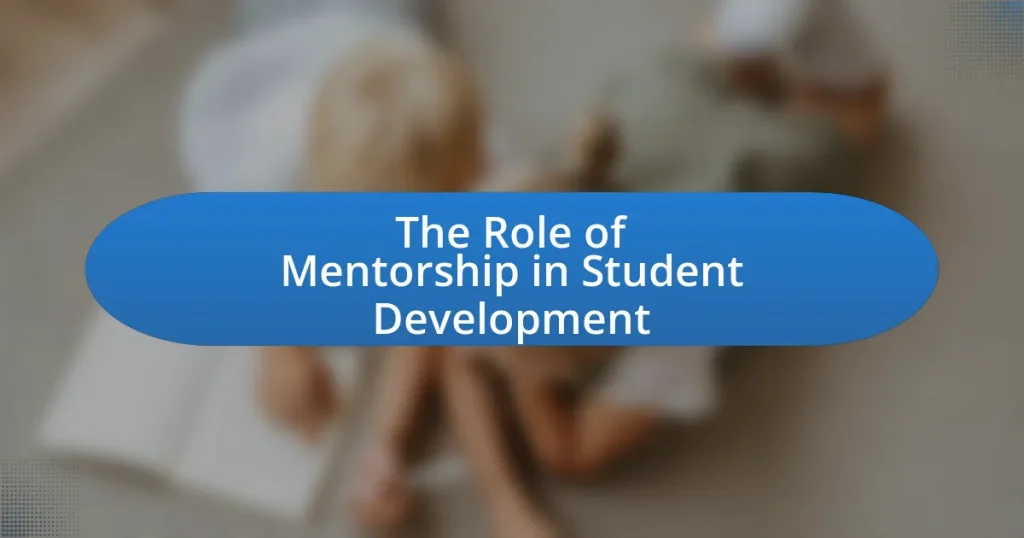Mentorship is a vital component of student development, providing essential guidance, support, and knowledge transfer from experienced individuals to students. This article explores the significant impact of mentorship on personal growth, academic performance, and skill development, highlighting research that shows mentored students achieve higher GPAs and increased retention rates. Key components of effective mentorship, including communication, mutual respect, and goal setting, are discussed, along with the psychological benefits students gain, such as enhanced self-esteem and emotional resilience. The article also examines different types of mentorship in educational settings, the challenges faced by mentors and mentees, and best practices for fostering successful mentoring relationships.

What is the Role of Mentorship in Student Development?
Mentorship plays a crucial role in student development by providing guidance, support, and knowledge transfer from experienced individuals to students. This relationship fosters personal growth, enhances academic performance, and builds essential skills such as critical thinking and problem-solving. Research indicates that students with mentors are more likely to pursue higher education and achieve career success, as mentorship often leads to increased confidence and motivation. For instance, a study published in the Journal of Educational Psychology found that students who engaged in mentorship programs showed a 20% improvement in academic outcomes compared to those without mentors.
How does mentorship influence student growth and learning?
Mentorship significantly enhances student growth and learning by providing personalized guidance and support. Mentors facilitate skill development, boost confidence, and foster critical thinking through tailored feedback and encouragement. Research indicates that students with mentors are more likely to achieve academic success, as evidenced by a study published in the Journal of Educational Psychology, which found that mentored students had higher GPAs and increased retention rates compared to their non-mentored peers. This influence is further supported by the National Mentoring Partnership, which reports that mentored students are 55% more likely to enroll in college and 78% more likely to volunteer regularly in their communities.
What are the key components of effective mentorship?
The key components of effective mentorship include clear communication, mutual respect, goal setting, and ongoing support. Clear communication ensures that both mentor and mentee understand expectations and feedback, fostering a productive relationship. Mutual respect establishes a foundation of trust, allowing for open dialogue and vulnerability. Goal setting provides direction and measurable outcomes for the mentorship process, enhancing motivation and accountability. Ongoing support involves regular check-ins and encouragement, which are crucial for the mentee’s growth and development. Research indicates that effective mentorship significantly contributes to student success, as evidenced by studies showing that mentored students often achieve higher academic performance and greater career satisfaction.
How do mentors facilitate skill development in students?
Mentors facilitate skill development in students by providing guidance, support, and personalized feedback tailored to individual learning needs. This relationship fosters an environment where students can explore their interests, set goals, and develop critical thinking and problem-solving skills. Research indicates that mentorship significantly enhances academic performance and personal growth; for instance, a study published in the Journal of Educational Psychology found that students with mentors showed a 20% increase in skill acquisition compared to those without mentorship. This evidence underscores the effectiveness of mentorship in promoting essential skills and competencies in students.
Why is mentorship important for students?
Mentorship is important for students because it provides guidance, support, and knowledge that enhance their academic and personal development. Mentors help students navigate challenges, set goals, and develop skills necessary for success. Research indicates that students with mentors are more likely to achieve higher academic performance and have increased self-esteem. For instance, a study published in the Journal of Educational Psychology found that mentorship positively influences students’ motivation and engagement, leading to better educational outcomes.
What psychological benefits do students gain from mentorship?
Students gain several psychological benefits from mentorship, including increased self-esteem, enhanced emotional resilience, and improved stress management. Mentorship provides students with guidance and support, fostering a sense of belonging and validation, which contributes to higher self-esteem. Research indicates that students with mentors report feeling more confident in their abilities and decisions, as mentorship often involves personalized feedback and encouragement. Additionally, mentorship helps students develop emotional resilience by equipping them with coping strategies and problem-solving skills, which are essential for navigating academic and personal challenges. A study published in the Journal of Educational Psychology found that students who engaged in mentorship programs exhibited lower levels of anxiety and better stress management techniques compared to those without mentors.
How does mentorship impact academic performance?
Mentorship positively impacts academic performance by providing guidance, support, and resources that enhance students’ learning experiences. Research indicates that students with mentors often achieve higher grades, exhibit increased motivation, and demonstrate improved retention rates. For instance, a study published in the Journal of Educational Psychology found that students who engaged in mentorship programs had a 20% increase in GPA compared to those without mentors. This improvement is attributed to the personalized feedback and encouragement mentors offer, which fosters a conducive learning environment and helps students navigate academic challenges effectively.

What types of mentorship exist in educational settings?
In educational settings, the primary types of mentorship include peer mentorship, faculty mentorship, and professional mentorship. Peer mentorship involves students supporting each other, fostering collaboration and shared learning experiences. Faculty mentorship consists of educators guiding students academically and personally, often enhancing students’ understanding of their field and providing career advice. Professional mentorship connects students with industry professionals, offering insights into career paths and networking opportunities. Research indicates that mentorship significantly improves student retention and success rates, highlighting its critical role in student development.
How do formal and informal mentorship differ?
Formal mentorship is structured and typically involves a designated mentor-mentee relationship with specific goals and guidelines, while informal mentorship is more spontaneous and can occur naturally without a formal framework. Formal mentorship programs often include scheduled meetings, defined roles, and measurable outcomes, which are designed to facilitate professional development and skill acquisition. In contrast, informal mentorship relies on personal connections and organic interactions, allowing for a more flexible and personalized approach to guidance. Research indicates that both types of mentorship can significantly impact student development, but formal mentorship tends to provide clearer pathways for achieving specific educational or career objectives.
What are the characteristics of formal mentorship programs?
Formal mentorship programs are structured initiatives designed to facilitate the development of mentees through guided relationships with mentors. These programs typically include defined objectives, a matching process between mentors and mentees based on skills and needs, and established timelines for engagement. Additionally, they often incorporate training for mentors, regular check-ins to assess progress, and evaluation metrics to measure outcomes. Research indicates that structured mentorship can lead to improved academic performance and increased retention rates among students, highlighting the effectiveness of these programs in fostering student development.
How can informal mentorship be fostered among peers?
Informal mentorship among peers can be fostered by creating opportunities for collaboration and open communication. Encouraging group projects, study sessions, and social events allows individuals to share knowledge and experiences organically. Research indicates that peer interactions enhance learning outcomes, as demonstrated in a study by Topping (1996), which found that peer tutoring significantly improves academic performance and social skills. By establishing a supportive environment where students feel comfortable seeking advice and sharing insights, informal mentorship can thrive, leading to enhanced personal and academic development.
What roles do mentors play in student development?
Mentors play crucial roles in student development by providing guidance, support, and resources that enhance academic and personal growth. They facilitate skill development, such as critical thinking and problem-solving, by sharing their experiences and knowledge. Research indicates that students with mentors are more likely to achieve higher academic performance and exhibit increased self-confidence, as evidenced by a study published in the Journal of Educational Psychology, which found that mentorship positively correlates with student engagement and motivation. Additionally, mentors help students navigate challenges, build networks, and set career goals, ultimately contributing to their overall success and well-being.
How do mentors provide guidance and support?
Mentors provide guidance and support by sharing their expertise, offering constructive feedback, and facilitating personal and professional growth. They engage in active listening to understand the mentee’s goals and challenges, which allows them to tailor their advice effectively. Research indicates that mentorship can lead to improved academic performance and increased confidence among students, as evidenced by a study published in the Journal of Educational Psychology, which found that students with mentors reported higher levels of motivation and engagement. Additionally, mentors often serve as role models, demonstrating behaviors and attitudes that mentees can emulate, further enhancing the learning experience.
What strategies do mentors use to motivate students?
Mentors use various strategies to motivate students, including setting clear goals, providing constructive feedback, and fostering a supportive environment. By establishing specific, achievable objectives, mentors help students focus their efforts and track their progress, which enhances motivation. Constructive feedback allows students to understand their strengths and areas for improvement, encouraging them to strive for excellence. Additionally, creating a supportive environment where students feel valued and understood promotes confidence and resilience, further motivating them to engage in their learning. Research indicates that mentorship significantly impacts student motivation and academic performance, highlighting the effectiveness of these strategies in fostering student development.

What challenges do mentors and mentees face?
Mentors and mentees face several challenges, including communication barriers, mismatched expectations, and time constraints. Communication barriers can arise from differences in communication styles or misunderstandings, which hinder effective dialogue. Mismatched expectations occur when mentors and mentees have different goals or understandings of the mentoring relationship, leading to frustration. Time constraints affect both parties, as mentors often have limited availability due to other commitments, while mentees may struggle to find time for meetings and follow-ups. These challenges can impede the development of a productive mentoring relationship, ultimately affecting the mentee’s growth and learning experience.
How can communication barriers affect mentorship?
Communication barriers can significantly hinder mentorship by obstructing the exchange of ideas, feedback, and support between mentors and mentees. When mentors and mentees struggle to understand each other due to language differences, cultural misunderstandings, or varying communication styles, the effectiveness of the mentorship relationship diminishes. Research indicates that effective communication is crucial for building trust and rapport, which are essential components of successful mentorship. For instance, a study published in the “Journal of Educational Psychology” found that clear communication positively correlates with mentee satisfaction and learning outcomes. Therefore, overcoming communication barriers is vital for fostering productive mentorship relationships that enhance student development.
What are common misconceptions about mentorship?
Common misconceptions about mentorship include the belief that mentorship is solely about providing advice or that it requires a significant time commitment. Many people think mentors only need to share their expertise, but effective mentorship also involves active listening and fostering a supportive relationship. Additionally, the idea that mentorship demands extensive time investment is misleading; even brief, focused interactions can be impactful. Research indicates that structured mentorship programs can yield positive outcomes with minimal time involvement, demonstrating that quality often outweighs quantity in mentorship relationships.
How can mentors overcome challenges in their relationships with students?
Mentors can overcome challenges in their relationships with students by fostering open communication and building trust. Establishing a safe environment for dialogue encourages students to express their concerns and needs, which can help mentors address issues proactively. Research indicates that effective communication enhances the mentor-mentee relationship, leading to improved academic outcomes and personal development. For instance, a study published in the “Journal of Educational Psychology” found that students who felt comfortable communicating with their mentors reported higher levels of satisfaction and engagement in their educational experience. By prioritizing transparency and active listening, mentors can navigate and mitigate relational challenges effectively.
What are the best practices for effective mentorship?
Effective mentorship involves establishing clear goals, fostering open communication, and providing constructive feedback. Setting specific, measurable objectives helps both the mentor and mentee stay focused on desired outcomes. Open communication encourages trust and allows mentees to express their concerns and aspirations freely. Constructive feedback is essential for growth, as it guides mentees in improving their skills and understanding their strengths and weaknesses. Research indicates that mentorship programs with structured frameworks and regular check-ins significantly enhance student development and engagement, leading to improved academic performance and personal growth.
How can mentors establish trust with their mentees?
Mentors can establish trust with their mentees by demonstrating consistency and reliability in their actions and communications. When mentors consistently follow through on commitments and provide honest feedback, mentees feel secure in the relationship. Research indicates that trust is built through open communication, where mentors actively listen to mentees’ concerns and validate their feelings, fostering a safe environment for sharing. Additionally, mentors who share their own experiences and vulnerabilities can create a deeper connection, as this authenticity encourages mentees to be open in return.
What techniques can mentors use to set achievable goals with students?
Mentors can use the SMART criteria to set achievable goals with students, which stands for Specific, Measurable, Achievable, Relevant, and Time-bound. This technique ensures that goals are clearly defined and realistic, enhancing the likelihood of success. For instance, a mentor might help a student set a specific goal to improve their math grade by 10% within the next semester, making it measurable and time-bound. Research indicates that goal-setting frameworks like SMART significantly improve student motivation and performance, as evidenced by a study published in the Journal of Educational Psychology, which found that students who set SMART goals were 20% more likely to achieve their academic objectives compared to those who did not.
How can students maximize the benefits of mentorship?
Students can maximize the benefits of mentorship by actively engaging with their mentors and setting clear goals for the mentorship relationship. Engaging involves regular communication, seeking feedback, and being open to advice, which fosters a productive dialogue. Setting specific, measurable goals allows students to focus their efforts and track their progress, ensuring that the mentorship is aligned with their academic and career aspirations. Research indicates that students who establish clear objectives with their mentors report higher satisfaction and greater achievement in their educational pursuits. For instance, a study published in the Journal of Educational Psychology found that goal-setting in mentorship relationships significantly enhances student motivation and performance.
What proactive steps can students take to engage with their mentors?
Students can engage with their mentors by scheduling regular meetings to discuss goals and progress. This proactive approach fosters open communication and strengthens the mentor-mentee relationship. Additionally, students should prepare specific questions or topics to discuss during these meetings, demonstrating their commitment and interest in the mentorship process. Research indicates that structured interactions, such as setting agendas for meetings, significantly enhance the effectiveness of mentorship (Kram, 1985, “Mentoring at Work: Developmental Relationships in Organizational Life”). By actively seeking feedback and implementing suggestions from mentors, students can further deepen their engagement and show appreciation for the mentor’s guidance.
How can students provide feedback to improve the mentorship experience?
Students can provide feedback to improve the mentorship experience by utilizing structured surveys and regular check-ins with mentors. Structured surveys allow students to express their thoughts on the mentorship process, including areas of strength and opportunities for improvement. Regular check-ins facilitate open communication, enabling students to discuss their experiences and suggest changes in real-time. Research indicates that feedback mechanisms, such as surveys, can lead to a 20% increase in mentorship satisfaction when implemented effectively. This demonstrates that systematic feedback collection is essential for enhancing the mentorship experience.


